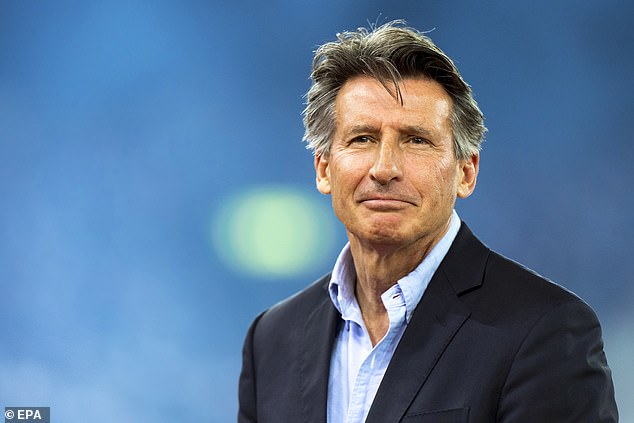- Lord Coe has been confirmed as one of seven candidates for the IOC presidency
- Former gold medallist swimmer Kirsty Coventry is also in the running.
- An IOC letter was sent to members last week outlining the criteria for replacement.
Lord Sebastian Coe has formally declared his claim to the most powerful job in sport despite severe barriers to him becoming president of the International Olympic Committee.
The IOC last week sent a letter to its 111 members outlining the criteria for replacing Thomas Bach next year and questioning Coe’s eligibility for the job, with Olympic experts interpreting the rules as a ploy to keep him out of the job.
But the 67-year-old World Athletics president pressed ahead with his bid and was confirmed among seven candidates on a list released by the IOC on Monday.
Coe said in a statement: ‘I am excited and honoured to share with you that I will be running for the Presidency of the International Olympic Committee as recently announced by the IOC.
‘Olympic sport is fundamental to my DNA. I have had the privilege of being a double Olympic champion, I have chaired an Olympic and Paralympic Games – London 2012 – from the bid, through to the execution and implementation of the legacy, I have chaired a National Olympic Committee – the BOA – and I have led an international federation through turbulent times, maintaining the position of athletics as a cornerstone of the Olympic Games.
Lord Sebastian Coe has been confirmed as one of seven candidates for the IOC presidency

There are six other confirmed candidates seeking to replace Thomas Bach (pictured)

Former swimming gold medallist Kirsty Coventry (pictured) is also in the running for the presidency.
‘Sport plays a vital role in promoting and maintaining the health and fitness of people, young and old, in all countries around the world. But it faces significant challenges on multiple fronts.
‘During the COVID years, many people were forced to struggle with inactivity and many sports organisations suffered from a lack of funding. We need to invest more in both areas over the next decade.
“The IOC must focus on sport with the utmost precision. I believe I can contribute to achieving this and much more.”
Coe will face competition from Spain’s Juan Antonio Samaranch Jr, son of the late former IOC president, as well as Zimbabwe’s sports minister and former swimming gold medallist Kirsty Coventry, and David Lappartient, who is the French head of cycling’s world governing body.
Jordan’s Prince Feisal, British-Swedish billionaire businessman Johan Eliasch and international gymnastics federation chief Morinari Watanabe of Japan are also in the running, and Bach is rumoured to be privately lobbying for Coventry to be chosen.
As a double Olympic champion who organised the 2012 London Games and then took a hard line on Russian doping and gender issues in his current role, Coe is seen by many outside the tent as the stand-out candidate. But in the complex and often Machiavellian realm of IOC politics, he faces a significant challenge to be elected at its session in Greece next March.

Coe said: ‘Olympic sport is fundamental to my DNA’ in a statement released where he revealed he will be running

The magnitude of Coe’s task was illustrated by the IOC ethics committee’s letter to its members last week, which reiterated the age limit of 70 for members, with the possibility of a one-time four-year extension. Since Coe turns 68 this month, that would mean a presidency of just six years when the mandate is scheduled to last eight years; those limits would have to change.
The letter also said the president would have to serve a full term as an IOC member, and Coe’s complication is that his current membership is through his seat at World Athletics, which he would give up if elected. As with the issue of his age, experts believe there are solutions on both fronts, but they are presented as obstacles.


